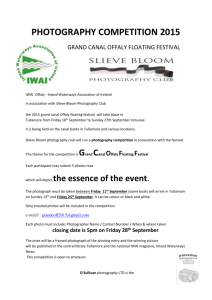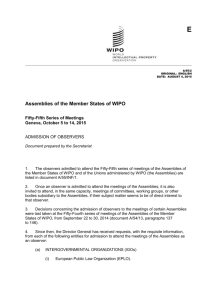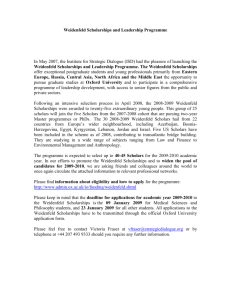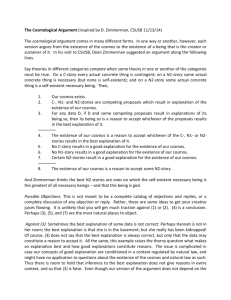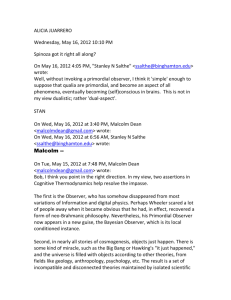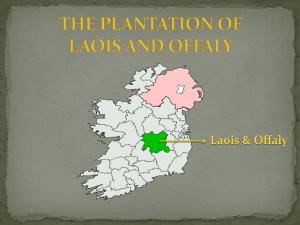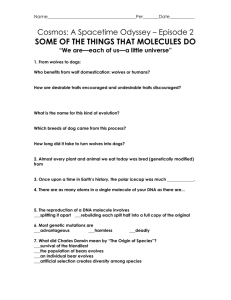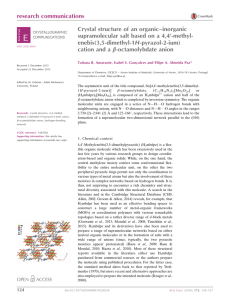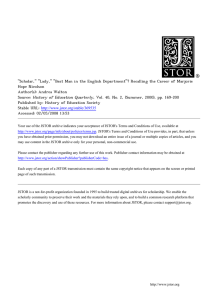Science & Religion - All Hallows College
advertisement
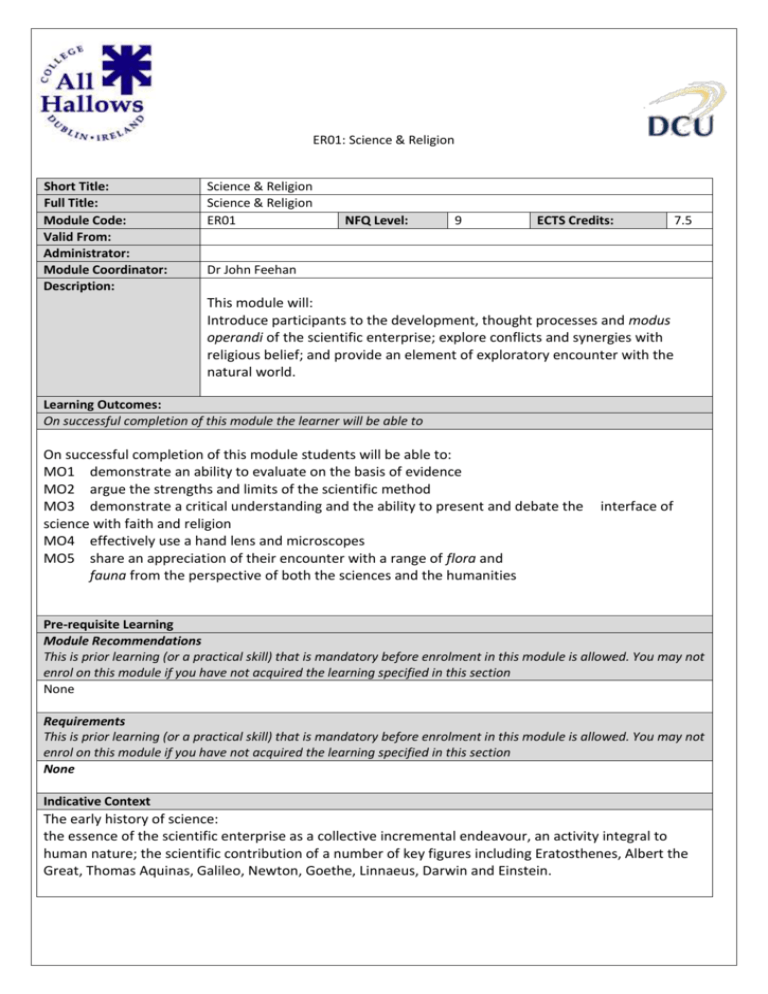
ER01: Science & Religion Short Title: Full Title: Module Code: Valid From: Administrator: Module Coordinator: Description: Science & Religion Science & Religion ER01 NFQ Level: 9 ECTS Credits: 7.5 Dr John Feehan This module will: Introduce participants to the development, thought processes and modus operandi of the scientific enterprise; explore conflicts and synergies with religious belief; and provide an element of exploratory encounter with the natural world. Learning Outcomes: On successful completion of this module the learner will be able to On successful completion of this module students will be able to: MO1 demonstrate an ability to evaluate on the basis of evidence MO2 argue the strengths and limits of the scientific method MO3 demonstrate a critical understanding and the ability to present and debate the science with faith and religion MO4 effectively use a hand lens and microscopes MO5 share an appreciation of their encounter with a range of flora and fauna from the perspective of both the sciences and the humanities interface of Pre-requisite Learning Module Recommendations This is prior learning (or a practical skill) that is mandatory before enrolment in this module is allowed. You may not enrol on this module if you have not acquired the learning specified in this section None Requirements This is prior learning (or a practical skill) that is mandatory before enrolment in this module is allowed. You may not enrol on this module if you have not acquired the learning specified in this section None Indicative Context The early history of science: the essence of the scientific enterprise as a collective incremental endeavour, an activity integral to human nature; the scientific contribution of a number of key figures including Eratosthenes, Albert the Great, Thomas Aquinas, Galileo, Newton, Goethe, Linnaeus, Darwin and Einstein. ER01: Science & Religion An exploration of key themes and their significance for faith: cosmic and organic evolution; the nature of matter and energy; time, earth history and earth process; a voyage in time – the world without us (an interlude in the Devonian); palaeontology; our common ancestry — introduction to genetics; biodiversity; the great chain of being and the tree of life; the complexity of life and individual species; the dignity of the individual species; the etymology of creation, each a glimpse of God’s self- expression; the creation as revelation; trees and the human species; the animal mind. The duty of care consequent on relationship: elementary ecology; environment and ethics; science and faith (salvation, community, virtue, eternal life; human uniqueness); the rainforest on your doorstep: an introduction to local biodiversity looking and seeing with new eyes, microscope, telescope, remote sensing. Direct experience of the diversity of life is an essential part of the course. This is achieved through a number of short outdoor sessions (taken to a more advanced stage in the Burren), and laboratory work (including an introduction to the microscope). Assessment Breakdown % Essay Linked to Module Outcome: MO1, MO2 MO3 Laboratory & Field Work Linked to Module Outcome:, MO4, MO5 Coursework Breakdown Type Description Workload Type Lecture Independent Learning Library Assignment Laboratories 100% Outcome addressed % of Total Assessment Date Full-Time Hours per semester Description Lecturing input Self-directed reading and revision Self and tutor-directed reading of course material Researching, structuring information, writing up Hours 24 160 6 Total Workload 190 ER01: Science & Religion Resources Essential Book Resources Berry, T. & Swimme, B.The Universe Story: From the Primordial Flaring Forth to the Ecozoic Era, A Celebration of the Unfolding of the Cosmos. London: HarperCollins, 1992. (Reprint edition 1994) Dawkins, Richard,The God Delusion, Orlando, Fla: Houghton Mifflin, 2006. Feehan, John,The Wildflowers of Offaly. Offaly: Offaly County Council, 2009. Feehan, John,The Singing Heart of the World. Dublin: The Columba Press, 2010. Haught, John F. Is Nature Enough? Meaning and Truth in the Age of Science, Cambridge: Cambridge University Press, 2006. Küng, Hans,The Beginning of All Things. Science and Religion, Eerdmans, 2007. McDonagh, Sean,The Death of Life. The Horror of Extinction, Dublin: Columba Press, 2004. McGrath, Alister, Dawkins’ God. Genes,Memes and the Meaning of Life. Hoboken, NJ: Wiley Blackwell, 2004. Essential Article/Paper Resources Other Resources Gould, Stephen Jay, (general editor) The Book of Life, London: Ebury Hutchinson, 1993. Gould Stephen Jay, Rocks of Ages: Science and Religion in the Fullness of Life London: Jonathan Cape, 1999. Gribbin, John. Companion to the Cosmos, London: Weidenfeld and Nicolson, 1996. (ed.) A Brief History of Science. London: Weidenfeld and Nicolson, 1998. Haught, John, F.The Promise of Nature. Ecology and Cosmic Purpose, Mahwah, N.J.: Paulist Press, 1993 Toolan, David, At Home in the Cosmos, New York: Orbis, 2001. Wilson, Edward O.,The Diversity of Life, Allen Lane: the Penguin Press, 1992. ER01: Science & Religion Module Managers & Teachers Module Coordinators Semester Semester One Semester Two Module Teachers Staff Member Staff Member Staff Number Staff Number
